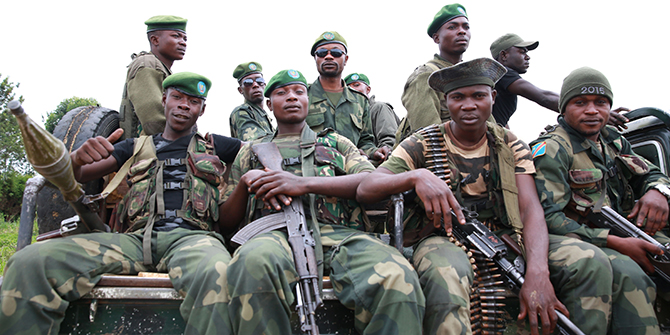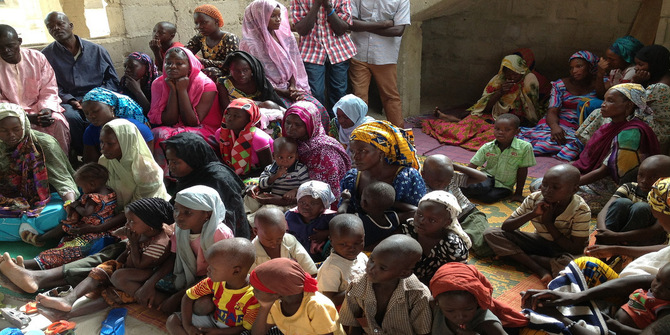The Regional Stabilisation Strategy is illustrative of a development model that can build local resilience to counter transnational terror threats. It seeks to incorporate non-military actors in efforts to consolidate the gains of security forces as well as sustainably address the root causes of conflict in the Lake Chad region.
Since 2009, Boko Haram and its splinter group, the Islamic State West Africa Province (ISWAP), have remained largely responsible for militant jihadist group activity in the four countries bordering the Lake Chad: Chad, Cameroon, Niger and Nigeria. The violence from the two groups has deepened instability, stifled economic growth and engendered humanitarian concerns. In efforts to stabilise the Lake Chad Basin region, academic and policy practitioners have mainly focused on the terrorism component of the crises, with funding generally geared towards increasing regional cooperation for counterterrorism offensives through the Multinational Joint Task Force (MNJTF).
Although coordinated military operations with national governments and the MNJTF have been relatively successful in retrieving territory formerly held by Boko Haram and ISWAP, these military strategies have remained incomplete in effectively addressing the many complex root causes that have resulted in increased activities from violent extremist organisations operating in the Lake Chad area.
What is the Regional Stabilisation Strategy?
The establishment of the Regional Stabilisation Strategy (RSS) in 2018 is a welcome development in countering the transnational terrorist threats from Boko Haram and its affiliates. The five-year strategy – a product of broad consultations among regional experts, relevant agencies of the United Nations and other stakeholders such as civil society representatives and bilateral partners – aims to address the structural challenges of vulnerability and insecurity for sustainable peace and development in the Lake Chad region. The Strategy also demonstrates the commitment of the Lake Chad Basin Commission in developing non-military regional responses that can complement the efforts of the MNJTF and member states in stabilising Boko Haram-affected areas. By recognising the important nexus between governance, security and humanitarian intervention and development, the Strategy calls for a ‘New Way of Working’ to be at the heart of the response to the Lake Chad Basin crises.
Promoted programmes and initiatives under the RSS are anchored in the commonalities of affected states while acknowledging the peculiarities of each of the concerned Lake Chad Basin member countries. For example, the Governor Forum – comprising the governors of the regions in Cameroon, Chad, Niger and Nigeria most affected by the violence caused by Boko Haram and related challenges – promotes continuous dialogue and the sharing of information, best practices and lessons learned from the implementation of the RSS. As such, the Governor Forum has been essential in identifying regional and cross-border priorities that have included strengthening cross-border trade, regional economic development and employment opportunities, especially for youth, as part of efforts to reduce recruitment for violent extremist organisations. The Forum has also highlighted the need to rehabilitate and reintegrate victims of the Boko Haram insurgency and ex-combatants, along with increasing the engagement of civil society, including traditional and religious leaders in managing local conflicts.
Moreover, to ensure an integrated, targeted and sequenced move from humanitarian assistance to sustainable development in Boko Haram-affected areas, a civil-military co-operation cell reinforces the capacity of the MNJTF by building trust between communities, governments and security providers. For instance, in reinforcing the capacity of the multinational force, the civil-military co-operation cell of the joint task force supports MNJTF troops by facilitating training and workshops for newly deployed military personnel on human rights and humanitarian law. These training programmes have improved the attitude and skills of MNJTF troops, particularly their ability to engage in strategies related to civilian protection to win the hearts and minds of local communities.
Challenges for implementing the Strategy
Implementation of the Strategy has remained slow, however, suffering from funding gaps and challenges. Despite its establishment, affected countries have continued to rely on military institutions to address governance issues in the region, with the MNJTF and national security troops remaining the face of regional and national strategies to counter violent extremism in the Lake Chad region. Although MNJTF troops and national armies have engaged Boko Haram and ISWAP with superior training and equipment from the US, France specifically and the EU, operations have rarely been sustained with longer-term development projects and initiatives, resulting in insurgents being able to quickly regroup after MNJTF operations.
This has been further exacerbated by the COVID-19 pandemic. Despite the RSS outlined prioritisation for 2019/20, for example, the Lake Chad Basin Commission and MNJTF civilian staff were unable to carry out most of the proposed critical infrastructure development projects in target communities. This limited engagement with local communities as a result of travel restrictions and border closures from the COVID-19 pandemic contributed to member states’ further reliance on military institutions to counter Boko Haram as well as the growing distrust between local populations and state security forces in some communities in the region.
Nevertheless, the recent establishment of the RSS is illustrative of a development model of stabilisation that can complement military efforts as well as address the root causes of the Lake Chad crises, combining hard-security interventions and soft-security measures. It is also more ambitious when compared to short-term military approaches with respect to building state legitimacy in order to undercut support for violent organisations.
Most important, the Strategy represents a sustainable framework from which scholars and practitioners can learn. Thus, despite its current challenges, there is room for member states and international partners to note aspects of the Strategy that have been most effective and aspects that need improvement. This will be essential in promoting community-driven solutions that can boost the resilience of member states as well as address the region’s complex crises while ensuring the human security of local populations.
This article is excerpted from the Author’s SWAC/OECD West African Papers series, ‘Non-Military Actors as a Regional Strategy in the Lake Chad Region’. The longer version can be found here.
Photo: Security Council Hears from Mission to Lake Chad Basin. A view from an interpreters’ booth as the Deputy Secretary-General addresses the Council. Credit: UN Photo/Manuel Elias. Licensed under CC BY-NC-ND 2.0.





